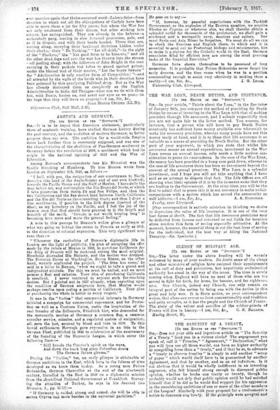THE WAR LOAN, DEATH DUTIES, AND INSURANCE. (To TILE EDITOR.
OF TEE " SPECTATOE."3
Sta,—In your article, "Points about the Loan," in the Spectator of January 20th, you compare the method of providing for Death Duties by means of investing in the War Loan with that of making provision through life assurance, and I submit respectfully that you are not quite fair to the latter method. You assume, for instance, that a person who will hare to pay Death Duties eventually has sufficient loose money available now wherewith to make the necessary provision, whereas many people bare not this money ready at hand, and it is to these that life assurance is so valuable as a means of providing for Death Duties. But the other part of your argument, in which you state that whilst life assurance means an annual expenditure, investment in the War Loan means an annual income, only needs a little serious con- sideration to prove its unsoundness. In the case of the War Loan, the money has been provided in a lump sum paid down, whereas in the case of life assurance there ban been no investment beyond the amount of the annual premium. The War Loan is a splendid investment, and I hope you will not take anything that I have said as an attempt to dispute that fact. The Life Offices aro all showing what their opinion of it is by the immense sums that they are lending to the Government. At the same time, you will be the first to admit that to prove this it is not necessary to make unfair comparisons with a system which has served the community so [Our correspondent is entirely mistaken in thinking we desire to depreciate the value of life insurance. It is one of the very best forms of thrift. The fact that life insurance premiums may he deducted from income and returned as not liable for taxation alone renders this form of saving especially attractive. At the moment, however, the essential thing is not the best form of saving for the individual, but the best way of filling the National Treasury.—Ere Spectator.]






































 Previous page
Previous page